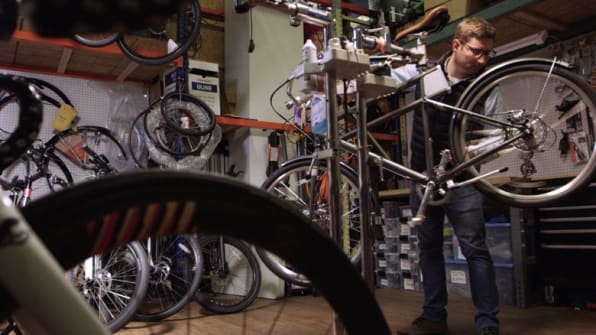Five Lessons This Longtime Cyclist Learned As A First-Time Business Owner
When Chris Nolte returned home after serving in the Iraq War, he found that he couldn’t ride a bike the same way he used to. In 2002, Nolte had sustained a painful back injury when a truck he was riding in careened into a ditch, and although he recovered, his back still hurt years later while cycling, a longtime hobby of his. Undaunted, Nolte set out to find a new way to ride.
He ordered an electric-assisted bicycle conversion kit online and transformed his old bike into a motorized ride. “You pedal and basically the bike amplifies what you put into it,” he says. “You feel that you’re riding, and you feel that you’re stronger than you actually are.” That experience led Nolte to open his own electric-assisted bike shop in 2011.
As CEO and founder of the Brooklyn-based Propel Bikes, Nolte now looks back and says his experience as a new entrepreneur was actually pretty similar to learning to ride a bike. Both are tricky balancing acts that take patience, practice, and constant on-the-fly recalibration. These are a few of the lessons Nolte says he drew on as an avid cyclist when it came to setting up his business.

1. Plan Your Route Ahead Of Time, Then Stay The Course
Some founders aren’t the best planners. They leave a lot to chance and try to adapt according to the circumstances. But long-distance cyclists usually prefer a more deliberate approach, and for good reason. One of the first things Nolte did after conceiving Propel Bikes was to carefully plot out a step-by-step business plan. “Planning a long bike ride also involves strategically thinking ahead, including mapping the basics of your route—key points of interest, where you will stop, take stock, and regroup, and, more importantly, where your ultimate destination is,” he says.
“Be sure to do the same with your startup,” he advises. “Don’t just dive in without a plan because, just as it is in biking, you could get lost or way off track . . . or never get where you wanted to go at all.”
2. Obstacles In Mirror Are Closer Than They Appear
For cyclists, hazards are inevitable. So the more you know, the better prepared you’ll be to face the unexpected challenges you can’t prepare for. Some of this comes down to tapping into the knowledge networks around you, whether it’s a cycling community or a business one. Says Nolte, “I learned about electric-assist bikes by building my own through trial and error, and by asking a lot of questions from people in the know.” That way, he says, “I knew which hurdles I had to clear when I started and what snafus to steer away from,” even though it was a novel pursuit.

3. Don’t Sprint Right From The Start
Nolte says that running your own business means playing the long game. Every experienced cyclist knows how crucial it is to conserve your energy and not blow it at the start. “Just as riding in a long race, it isn’t wise to wind yourself early by pedaling really fast right out of the gate,” he cautions. “Move with foresight and intention instead, thinking all the while about your business goals and how much time you’ve allotted to reach them. Then adjust your speed depending on the urgency of the deadlines you set for them.”
4. Minimize Distractions And Keep Your Eyes On The Road
While it’s enjoyable to casually explore your surroundings when biking, it’s also important to stay focused on what’s coming right at you, straight ahead. “If you look at something in your periphery for too long, you tend to veer away in that direction—or, worse, crash,” Nolte says. “The same goes for business,” he’s found. The “random details” that crossed his desk each day sometimes seemed like bigger problems than they were. Those routine operational worries that every entrepreneur confronts trying to get a new business off the ground become get overwhelming—if you let them. “If you get too lost in the weeds,” says Nolte, “you might not see the bigger picture of where your business is headed.”

5. Don’t Sweat The Competition—Just Remember They’re There
“When you’re riding competitively, you’ll want to see where you stack up against the competition,” Nolte says. “If you’re behind, how much harder do you have to pedal to position yourself ahead of them?” In a long bike race, competitors fan out. You often won’t know how many cyclists are ahead of you—and by how much—and how many are behind. But there’s a danger in fixating on your position in the pack.
“In business, it’s okay to keep your eye on your competitors, but you’re running your own race at the start, a race to survive the first year and beyond,” Nolte points out. “If you succeed, there will be plenty of time to catch up with the more experienced and established.”
He adds, “You’re in this for the long haul.”
Kim Lachance Shandrow is a senior editor for FreeEnterprise.com.
(46)














